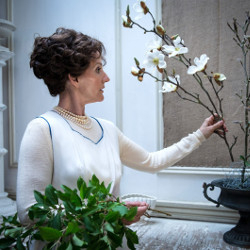Storm in a Flower Vase

A play about the superstar of floristry, Constance Spry, can be expected to look gorgeous. The Arts Theatre production of Anton Burge's new play, Storm in a Flower Vase, is classically elegant with sumptuous flower arrangements contrasting with the unfortunately clunky title.
Set in a large conservatory, the lighting is subtle, the soundscape perfectly establishes the feel of 1930s upper-class London, and the cast are sublime. Behind the floral beauty and calm, there's divorce, infidelity and lesbianism – and the potential for scandal that could have destroyed Spry's career had her unconventional marital arrangements become public.
Penny Downie's portrayal of Spry is superbly nuanced and note perfect. A complex and conflicted woman of her time, both buttoned-up and liberated, she was an innovator, entirely self-taught in floristry (or rather "floral decoration", as her husband insists on correcting her, "floristry" being considered a mere trade). Christopher Ravenscroft gives Shav the slappable air of the righteous prig, whose long-term affair with Val, their book-keeper (Sally George), is conducted with only a half-hearted attempt to hide their infidelity from Constance.
Spry is simultaneously hurt and liberated by the betrayal, entering into a relationship with the cross-dressing artist, Hannah Gluckstein (a lively performance from Carolyn Backhouse). All this is played out against the backdrop of 1930s society, with Spry in the circles of innovators in interior design such as Syrie Maughan (ex-wife of Somerset, played with panache by Carol Royle).
The contrast between the glorious and simple beauty of the floral displays and the complexity of the hidden relationships is well-made. Overall though, the piece feels unsatisfying. No doubt the closeted emotions of the period are accurately recreated, the infidelities and lies kept under wraps other than with close confidantes. But while the audience learns about Spry's work with the Red Cross and her presentations to schools and Women's Institutes, and the cookery books which also brought her fame, there remains a lack of depth that leaves too much unexplored. Spry's son from her first marriage, for example, is referenced in the programme notes but warrants not so much as a mention in the narrative of the play.
Overall, Anton Burge's piece is beautifully staged and directed by Alan Strachan and exposes the complicated mores of the 1930s. Well worth a viewing.










